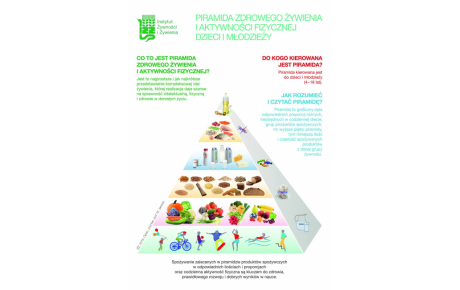The pyramid is a graphic description of appropriate amounts of nutrients, essential in a day-to-day diet. The higher the level, the smaller the amount and frequency of nutrients consumed from a specific food group.

The pyramid is a graphic description of appropriate amounts of nutrients, essential in a day-to-day diet. The higher the level, the smaller the amount and frequency of nutrients consumed from a specific food group.
Healthy eating rules
1. Eat regular meals (5 meals every 3-5 hours. If you exercise often, you can broaden your diet).
Begin your day with a balanced breakfast, this way you will provide energy for the first hours of learning/training. Remember, if you train in the morning, eat a light meal in a form of a sandwich/smoothie.
2. Eat veggies and fruit very often and in big amounts
Vegetables and fruit should be eaten with every meal. Before training, it’s worth eating these with a smaller amount of fibre so that they won’t cause discomfort – can be cooked or raw such as citrus fruit, zucchini, skinless tomato, pumpkin.
3. Eat wheat products, especially wholemeal ones.
Before the activity, it is worth taking under consideration these with a smaller amount of fibre such as millet, basmati rice, potatoes, rice pasta, durum pasta, graham and wheat bread.
4. Drink at least 3-4 glasses of milk daily. You can substitute them with natural yoghurt, kephir and partially with cheese.
If during training you feel discomfort from alimentary canal (stitch, stomach ache, splashing in the belly), give up diary produce containing lactose (sugar) such as cottage cheese, milk, yoghurts. You can change it to vegetable based milk: rice milk, almond milk or just take it in a different part of the day (breakfast, second breakfast, supper).
5. Eat fish, legumes and protein. Choose lean meat. Limit the consumption of processed meat products.
6. Limit the consumption of animal fats. Substitute them with plant oils.
7. Limit the consumption of sugar, sweets and sweet drinks. Substitute them with fruit and nuts.
8. Do not add salt to meals. Avoid salty snacks and fast food products.
Exceptionally, if you train few times per week, supplement your meals with electrolytes (sodium), adding salt to meals. You need to remember that during hard trainings, the organism loses significant amounts of sodium. This rule applies mainly to teenagers along with children to a lesser degree.
9. Remember about drinking water with and during the meals.
10. Be physically active daily at and outside school.
Source: IŻŻ 2016, elaborated under the guidance of prof. M. Jarosz
If you have any questions, write to me erwina.szymczyk@soccerskills.pro
dietary consultant PSS Erwina Szymczyk
www.strategiezywienia.pl